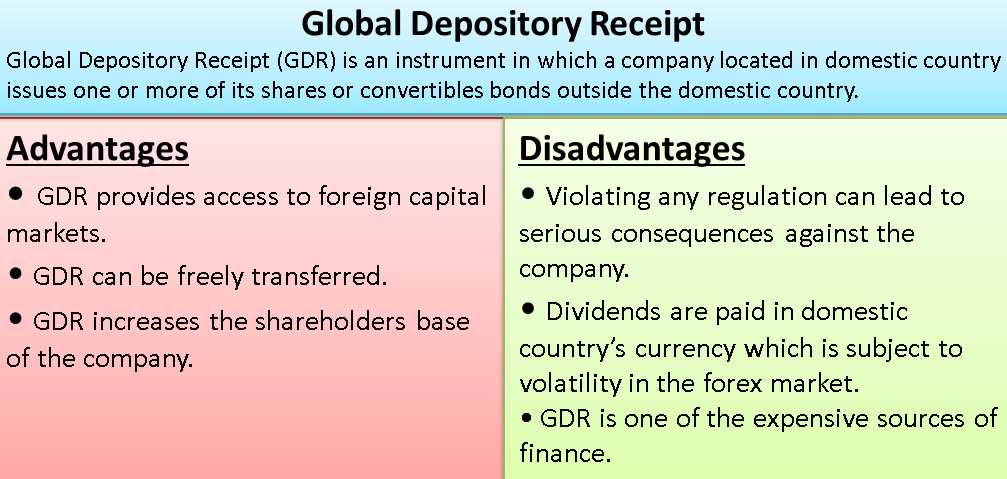Definition of Global Depository Receipt
Global Depository Receipt (GDR) is an instrument in which a company located in a domestic country issues one or more of its shares or convertibles bonds outside the domestic country. In GDR, an overseas depository bank, i.e., a bank outside the domestic territory of a company, issues shares of the company to residents outside the domestic territory. Such shares are in the form of a depository receipt or certificate created by overseas the depository bank.
Issue of Global Depository Receipt is one of the most popular ways to tap the global equity markets. A company can raise foreign currency funds by issuing equity shares in a foreign country.
Global Depository Receipt Example
A company based in the USA willing to get its stock listed on the German stock exchange can do so with the help of the GDR. The US-based company shall enter into an agreement with the German depository bank, which shall issue shares to residents based in Germany after getting instructions from the domestic custodian of the company. The shares are issued after compliance with the law in both countries.
Global Depository Receipt Mechanism
- The domestic company enters into an agreement with the overseas depository bank to issue GDR.
- The overseas depository bank then enters into a custodian agreement with the domestic custodian of such a company.
- The domestic custodian holds the equity shares of the company.
- On the instruction of the domestic custodian, the overseas depository bank issues shares to foreign investors.
- The whole process is carried out under strict guidelines.
- GDRs are usually denominated in U.S. dollars.

Let’s now look at the advantages and disadvantages of Global Depository Receipt.
Advantages of GDR
The following are the advantages of Global Depository Receipts:
- GDR provides access to foreign capital markets.
- A company can get itself registered on an overseas stock exchange or over the counter, and its shares can be traded in more than one currency.
- GDR expands the global presence of the company, which helps in getting international attention and coverage.
- GDR is liquid in nature as they are based on demand and supply, which can be regulated.
- The valuation of shares in the domestic market increase on listing in the international market.
- With GDR, the non-residents can invest in shares of the foreign company.
- GDR can be freely transferred.
- Foreign Institutional investors can buy the shares of companies issuing GDR in their country even if they are restricted to buy shares of foreign companies.
- GDR increases the shareholders’ base of the company.
- GDR saves the taxes of an investor. An investor will need to pay tax if he purchases shares in a foreign company, whereas in GDR same is not the case.
Disadvantages
The following are the disadvantages of Global Depository Receipts:
- Violating any regulation can lead to serious consequences for the company.
- Dividends are paid in the domestic country’s currency which is subject to volatility in the forex market.
- It is mostly beneficial to High Net-Worth Individual (HNI) investors due to their capacity to invest a high amount in GDR.
- GDR is one of the expensive sources of finance.
Conclusion
GDR is now one of the most important sources of finance in today’s world. With globalization, every company is willing to expand its wings. GDR makes it possible for such companies to reach and tap international markets. GDR provides companies in emerging markets with opportunities for rapid growth and development.
Also, read ADR vs GDR to learn the differences between the two.

